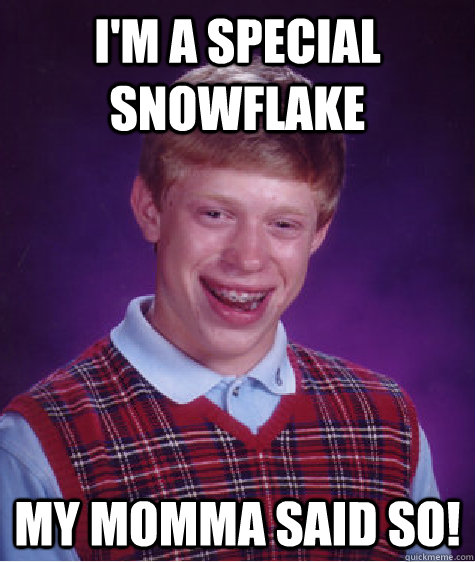Snowflake college students are the subject of a lengthy article published by The New Yorker.
In The Big Uneasy, author Nathan Heller introduces his readers to the snowflake students who attend Oberlin College, a place where, according to Heller, the norms run left of Bernie Sanders.
Just how flaky are these particular snowflakes? Well, during one semester at Oberlin, states Heller, “More than thirteen hundred students signed a petition calling for the college to eliminate any grade lower than a C for the semester, but to no avail.” Why were they making such a request? Answer: They were too busy with extracurricular activism to study well enough to make decent grades.
One student there was upset because he was made to take written exams instead of being allowed to take oral exams. Heller quotes the student as saying the following:
Because I’m dealing with having been arrested on campus, or having to deal with the things that my family are going through because of larger systems—having to deal with all of that, I can’t produce the work that they want me to do. But I understand the material, and I can give it to you in different ways. There’s professors who have openly been, like, ‘Yeah, instead of, you know, writing out this midterm, come in to my office hours, and you can just speak it,’ right? But that’s not institutionalized. I have to find that professor.
Such desire to be coddled extends to exposure to diverse thought. Heller quotes one Oberlin employee as saying, “People are so amazed that other people could have a different opinion from them that they don’t want to hear it.”
One student tells what happened after he advocated for more precise language in Oberlin’s sexual-harassment policy:
A student came up to me several days later and started screaming at me, saying I’m not allowed to have this opinion, because I’m a white cisgender male.
Heller quotes a leader of the Oberlin student government as saying, “I do think that there’s something to be said about exposing yourself to ideas other than your own, but I’ve had enough of that after my fifth year.”
One faculty member had to dissolve a course mid-semester and let students do independent study. Why? Answer: “Students went cold when they had to engage with anyone outside their community.”
This aversion to exposure to diversity of thought is addressed in an article published by The Atlantic. In it, authors Greg Lukiaoff and Jonathan Haidt state, “Something strange is happening at America’s colleges and universities. A movement is arising, undirected and driven largely by students, to scrub campuses clean of words, ideas, and subjects that might cause discomfort or give offense.”
Lukiaoff and Haidt elaborate:
The current movement is largely about emotional well-being. More than the last, it presumes an extraordinary fragility of the collegiate psyche, and therefore elevates the goal of protecting students from psychological harm. The ultimate aim, it seems, is to turn campuses into “safe spaces” where young adults are shielded from words and ideas that make some uncomfortable. And more than the last, this movement seeks to punish anyone who interferes with that aim, even accidentally. You might call this impulse vindictive protectiveness. It is creating a culture in which everyone must think twice before speaking up, lest they face charges of insensitivity, aggression, or worse.
Psychiatrist Keith Ablow gives his own diagnosis of the snowflake students:
We have created a nation filled with too many perpetual children — Peter and Patty Pans — who were brought up getting trophies for participating in sports, instead of winning, protected from the supposed horrors of being ranked by grades and scores and sold corrosive message by the likes of Barack Obama and Hilary Clinton that everyone deserves every kind of support, regardless of the level of education they have or the work they put forward. We have hobbled a generation, or two.
One wonders how these snowflake college students will survive once they leave the safety of their campus and enter the heat of the real world.
The “Wanted” posters say the following about David: “Wanted: A refugee from planet Melmac masquerading as a human. Loves cats. If seen, contact the Alien Task Force.”


















